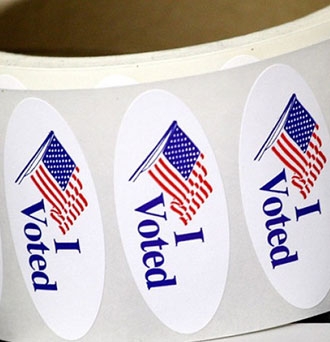
In campaigns, so much turns on identifying, persuading, and turning out the perennial likely voter. LVs, as they're known, are a consistent target of pollsters and, depending on if they're your supporters, the campaign's broader mobilization efforts. But in 2018, this question persists: How precisely can we measure which voters actually intend to vote, and which don't?
New research from my shop, the Environmental Voter Project, sheds light on this, while also revealing a deeper problem: People don't tell the truth to pollsters, and often report that they have voted in the past when records reveal that they haven't.
We recently surveyed 8,567 registered voters using state voter files, and asked each respondent to describe his or her voting behavior in detail. We then compared each person's survey response to his or her public voting history, measuring how often people say they vote, versus how often they actually vote.
The survey results were stunning: 78.1 percent of the poll's respondents over-reported their actual voting histories.
Voting respondents fell into three main groups: those who vote in every election, those who vote only in presidential and midterm elections, and those who vote only in presidential elections. In each of these three categories, a majority of respondents over-reported their actual voting histories. Only among people who said they "never vote" did we find a majority of respondents telling the truth.
These findings highlight a particularly strong "social desirability bias" with respect to voting habits: survey respondents answer in a way they think will be viewed favorably by others, rather than simply answering truthfully.
While pollsters have known about (and tried to control for) this phenomenon for some time, this new study reflects just how pervasive this problem is throughout the electorate. If the overwhelming majority (nearly 80 percent) of registered voters are over-reporting their past voting habits, even larger numbers of voters could be over-reporting their intent to vote in upcoming elections. Unless pollsters start basing their analyses on public voting histories -- which is rare and expensive -- they will struggle to accurately identify LVs.
Although problematic for pollsters, these findings create an important opportunity for voter mobilization organizations and campaigns. Where there is a significant difference between someone's reported behavior and their actual behavior, an opportunity arises to change that person's habits by highlighting this discrepancy.
Often referred to as "social pressure messaging," this turnout strategy pressures people to vote by monitoring their compliance with civic norms (such as the norm of being a good voter) and pointing our where their behavior contravenes those norms. This approach has successfully increased voter turnout in hundreds of recent mobilization experiments.
One reason social pressure messaging is so effective is that registered voters (even those who never vote) have a profound desire to be perceived by others as being good voters. As reflected in the Environmental Voter Project's study, even awful voters embrace the societal norm that voting is a good thing. Messages that play to this desire -- for instance, by reminding voters that their voting histories are public information -- can significantly increase turnout.
Moreover, collecting "voter pledges" from prospective voters -- and then reminding them of their pledge prior to Election Day -- can dramatically boost turnout. Voters don't necessarily need to be reminded of an upcoming election. But this pledge system works because people want to be viewed as honest promise-keepers. In fact, they're trying to comply with a societal norm.
Although our study didn't find any demographic groups that were particularly prone to lying about their voting histories, the survey's responses were not weighted to measure such results. In the future, it may be fruitful for researchers to measure whether certain voters are more likely to over-report their voting histories, as these populations might be uniquely susceptible to social pressure messaging.
In short, identifying which voters tend to lie about their voting histories might be just as important as knowing voters' opinions and priorities. People who say they vote but don't could be more likely to care about how their voting habits are perceived by others. And that's where social pressure turnout messaging could have its biggest impact.
Nathaniel Stinnett is the founder and executive director of the Environmental Voter Project, a non-partisan nonprofit that uses data analytics to identify non-voting environmentalists and then applies behavioral science to nudge them into being better voters.
